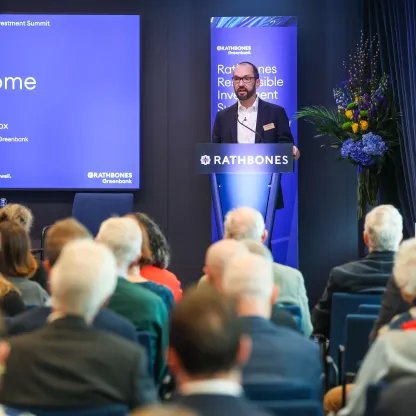Greenbank have recently joined the Business Coalition for a Global Plastics Treaty and signed the Finance Statement on Plastic Pollution, signalling our support for an international legally binding agreement to end plastic pollution. This follows our earlier engagement on the issue, collaborating with the Ellen MacArthur Foundation and as an endorser of the New Plastics Economy Global Commitment.

Greenbank’s engagement on plastic pollution
Article last updated 9 May 2024.
The urgent need for a global treaty on plastic pollution
Plastic pollution is currently one of the most pressing environmental issues. Industry experts expect that, without immediate action, the amount of plastic waste entering aquatic ecosystems could nearly triple by 2040.
Preventing plastic pollution is not just about improving waste management, but rethinking what is being produced and building solutions that prevent plastic waste from being created in the first place.
The current patchwork approach of national plastics regulations makes it difficult to drive change on a global scale. This is where a global treaty with common obligations can help to raise the bar for companies and provide momentum for systems change.
What is the INC?
The Intergovernmental Negotiation Committee (INC) on Plastic Pollution was formed in 2022, following the fifth session of the UN Environment Assembly (UNEA-5.2) where a resolution was adopted to develop an international legally binding instrument on plastic pollution.
Negotiations are ongoing, and momentum is building across key stakeholder groups, including the finance sector, with the fourth session recently taking place in Canada and the final session taking place in South Korea later in the year.
Greenbank support the advancement of a circular economy
Greenbank have been supporting the advancement of a circular economy through our investment and stewardship activities since its inception. For example, we previously endorsed The New Plastics Economy Global Commitment (the Commitment), launched in 2018 by the Ellen MacArthur Foundation in collaboration with the United Nations Environment Programme.
We engage with companies, encouraging them to move from a linear ‘take-make-dispose’ model of resource consumption to one which recirculates materials back into the economy at the end of life.
Greenbank recently joined the Business Coalition for a Global Plastics Treaty as a supporter and signed onto the Finance Statement on Plastic Pollution.
The Business Coalition for a Global Plastics Treaty, convened by the Ellen MacArthur Foundation and WWF, is a group of businesses from across the plastics value chain, financial institutions and Non-Governmental Organisations (NGOs) that advocate for a plastics treaty as the key policy mechanism to accelerate progress in eliminating plastic pollution.
We engage with companies, encouraging them to move
from a linear ‘take-make-dispose’ model of resource consumption
to one which recirculates materials back into the economy
at the end of life.
Greenbank have also signed the Finance Statement on Plastic Pollution, which was sent to member states negotiating an end to plastic pollution. The statement was endorsed by 160 financial institutions representing $15.5 trillion in combined assets and called for the treaty to be supported by binding rules and obligations across the plastics value chain, for it to ensure companies assess and disclose plastic-related risks and opportunities, and for it to be based on a scientific approach, among other areas.
We look forward to contributing to this collaborative effort as part of our wider engagement work on the circular economy. You can read more about Greenbank’s stewardship activities and our engagement plans for 2024 in our Engagement Review.




